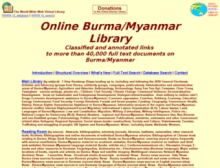Resource information
In recent years migration studies have theorized that 21st-century migration is following patterns that both incorporate and diverge from academic and policymaking explanations of late 20th-century migration. The case of Myanmar, whose out-migration is well-known and well-enumerated, nevertheless shows both a less-known pattern of in-migration in rural areas as well as environmental (and not only economic) factors in both in- and out- migration.
James Clifford’s earlier, Asia-Pacific-focused work Routes, published in 1997, was influential in modifying the conventional academic foci on migration. Addressing the “subjectivity” of the ethnographers of peoples and migrations and their subjects as more an issue of shared, though differing, ideas of movement and space, he brought a new awareness of the interplay between semantic webs purportedly possessed by fieldwork subjects and their would-be interpreters among scholars. He followed this work with a particular narrative of Native American migration in Returns, published in 2013. Both of these works open the door for new attempts to study and interview migrants in their own situations and to grasp the diversity of migration beyond push-pull factors. One burgeoning methodology within this new research initiative was that of ethnographic interviews with migrants. Clifford had revealed an extremely human, molecularly detailed side of interviewees and respondents. Newer works began to concentrate almost exclusively on the migrants’ own narratives and to pull slighter, more localized explanations from them in the same mode as Charmaz’s grounded theory. Here were the roots of ‘new migration’ ideas. With the wealth of published data becoming available from migrants worldwide, small and large differences between their experiences and general migration theory became more apparent...".....Paper delivered at the International Conference on Burma/Myanmar Studies: Burma/Myanmar in Transition: Connectivity, Changes and Challenges: University Academic Service Centre (UNISERV), Chiang Mai University, Thailand, 24-26 July 2015.




